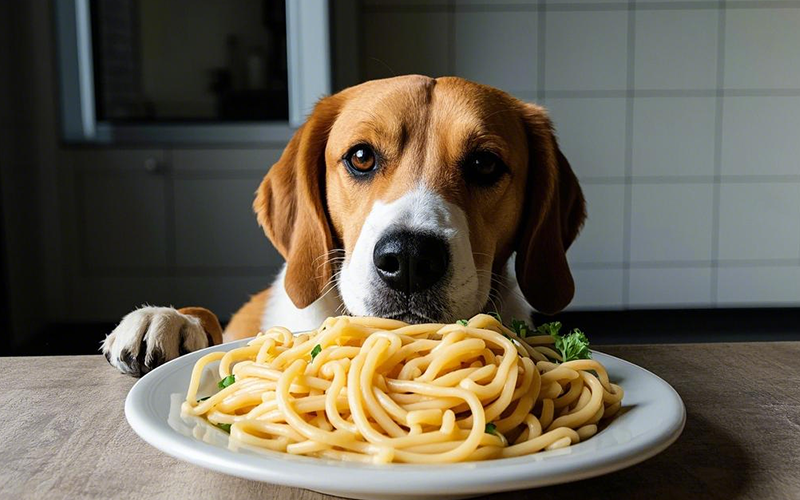Can Dogs Eat Noodles? Understanding the Safety and Risks of Feeding Noodles to Your Dog
- 21 Mar 2025 09:41
Many pet owners love to share their meals with their furry friends, but when it comes to certain foods like noodles, there are a few things to consider. So, the big question is: Can dogs eat noodles? 🍝 Let's explore the answer, along with the best practices for feeding your dog noodles and other pasta-based dishes. 🐾

Are Noodles Safe for Dogs to Eat?
In general, plain, cooked noodles are not toxic to dogs and can be given in moderation. Many common noodles—such as spaghetti, macaroni, or egg noodles—are made from simple ingredients like wheat flour, water, and sometimes eggs. These are not harmful to your dog as long as they are prepared without any harmful seasonings or sauces. 🙌
However, noodles are not a necessary part of a dog’s diet. While not toxic, they don’t provide much nutritional value compared to meat, vegetables, or dog food formulated for their specific needs. So while it's okay for your dog to have a small portion of plain noodles occasionally, it should not be a regular treat. 🐕
Important Considerations When Feeding Noodles to Dogs
1. Moderation Is Key
While noodles themselves are not harmful, they are primarily carbohydrates. If your dog consumes too many, it could lead to weight gain, especially if they’re not burning off the extra energy. 🏃♀️ Always offer noodles in small amounts and as an occasional treat.
2. Avoid Added Ingredients
One of the most important rules to follow when feeding noodles to your dog is to avoid added seasonings, sauces, or toppings. Ingredients like garlic, onions, butter, or cheese are toxic to dogs and can lead to severe health issues like digestive upset, toxicity, or pancreatitis. 😖
3. Gluten-Free Options
If your dog has a sensitivity or intolerance to gluten, make sure to choose gluten-free noodles. Some brands offer rice-based or quinoa-based noodles, which are safer for dogs with gluten sensitivities. 🌾
How to Safely Serve Noodles to Your Dog 🍽️
If you’re considering giving your dog noodles, here are some simple tips to follow:
Cook the noodles properly: Make sure they are fully cooked and soft, as uncooked noodles can be harder for dogs to digest.
No seasoning or sauces: Serve the noodles plain, without any added butter, garlic, salt, or seasoning.
Portion size: Only give small portions of noodles. Remember, these should be an occasional treat, not a daily snack.
Watch for any signs of digestive upset: If your dog shows signs of discomfort, such as vomiting or diarrhea, after eating noodles, it’s best to avoid them in the future.
Can Noodles Cause Digestive Problems for Dogs?
In some cases, if a dog eats too many noodles, especially if they have a sensitive stomach, it could lead to issues like bloating, gas, or diarrhea. Noodles are high in carbohydrates and can be hard to digest for some dogs. If you notice any digestive problems after feeding your dog noodles, you should avoid them moving forward. 🚫
What to Do if Your Dog Eats Too Many Noodles
If your dog happens to overeat noodles (or any other food), watch for signs like lethargy, vomiting, diarrhea, or bloating. If these symptoms occur, it’s always a good idea to reach out for help. With a reliable pet AI software like PettureX, you can easily get instant advice through 24-hour online consultations and even use its image recognition feature to better assess the situation. 🧑💻
The Bottom Line: Can Dogs Eat Noodles?
Yes, dogs can eat plain noodles in small amounts, but they should not be a regular part of your dog’s diet. Avoid seasoning, sauces, or harmful ingredients, and always remember to keep it as an occasional treat. While noodles are not toxic, they don’t provide significant health benefits, so they should only be given in moderation. 🐾
For peace of mind and the health of your dog, always keep an eye on what your pet eats. If you need quick advice or guidance, PettureX is a perfect tool for understanding your dog’s diet and health. With 24-hour consultations and advanced pet image recognition, PettureX ensures you have the support you need, anytime! 🐕💡
Keep your furry friend safe and happy with the right foods and the right tools! 🐾🎉
Related

Crunchy Curiosity: Can Dogs Safely Snack on Pork Rinds? A Deep Dive
- 21 Apr 2025
Pomegranate Seeds and Pooches: A Deep Dive into Whether Dogs Can Safely Indulge
- 21 Apr 2025
Can Dogs Eat Peaches? Vet Explains Benefits, Cyanide Risks & Safe Serving
- 16 Apr 2025
Can Dogs Eat Mulberries? Vet Explains Safety, Benefits & Potential Risks
- 16 Apr 2025
Can Dogs Eat Mozzarella? Vet Explains the Cheesy Truth (Risks & Benefits)
- 16 Apr 2025
Can Dogs Eat Maple Syrup? The Sugary Truth & Why Vets Advise Against It
- 16 Apr 2025
Can Dogs Eat Mango Skin? Vet Explains Why It's a Risky Chew!
- 16 Apr 2025
Can Dogs Eat Mac n Cheese? Vet Explains Why This Comfort Food Is Unsafe!
- 16 Apr 2025
Can Dogs Eat Liver? Vet Guide to This Nutrient-Dense Organ Meat (Benefits & Risks!)
- 16 Apr 2025
Can Dogs Eat Licorice? The Sweet Danger & Glycyrrhizin Risk Explained by Vets
- 16 Apr 2025
